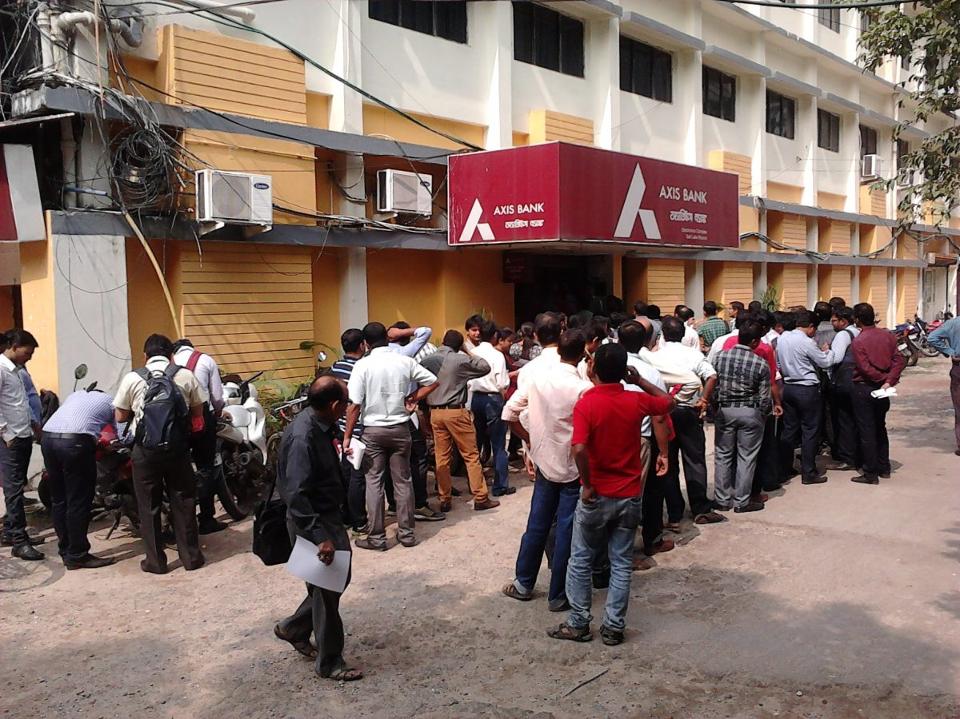The government of India shocked and dismayed its citizens on November 8th, when they announced the demonetization of the current 500 and 1000 rupee notes. The bills, worth about $7 and $14 respectively, amount to 86% of their cash in circulation. India’s 1.3 billion people get by with less than 200,000 ATMs in the country and 87% of transactions are cash.
Putting this in perspective for American readers, by the World Bank’s definition, middle income Indians make between 680 and 3,400 rupees a day. The last time the U.S. faced a disruption of this size to its money supply was during the bank runs after the Great Crash of 1929.
This move won’t cause India’s banks to crash; people are rushing to exchange the soon to be worthless notes, and the banks don’t have enough new notes to cover them, so their balances are swelling. But there is a downturn happening across the entire economy, as day to day activities decline due to the lack of liquidity needed to settle transactions. What happens in a situation like this? It turns out that many people look to commodities to hedge the risk of an economic slowdown; some people buy gold, others buy silver, but most interestingly, people buy Bitcoin.
I reached out to three pioneering Bitcoin startups in India to find out more about what is happening there.
Unocoin
Sunny Ray heard about Bitcoin on Twitter back in 2012. Similar to my entrepreneurial path, he says he went into “hibernation” for six months, learning everything he could about the cryptocurrency. When he emerged he launched the country’s first Bitcoin MeetUp. People would show up with bags of cash to purchase Bitcoin, which was exciting, but also inefficient and unsafe. Ray connected with Sathvik Vishwanath via the MeetUp and three years ago they launched Unocoin. The company fills a role in India similar to what Coinbase does here in the U.S., providing wallets and acting as a point of sale system.
BTCXIndia
Kamesh Mupparaju first thought about creating a remittance service, but then determined that running an exchange was where he wanted to be – “the settlement partner in India” is how this CEO describes BTCXIndia. They were doing 10 BTC a day at the start back in 2014 and since the demonetization their volume has increased tenfold.
Zebpay
Sandeep Goenka of Zebpay says that he and his two co-founders sought to make Bitcoin as simple as instant messaging for the average user. Launched in July of 2016, one fifth of their 250,000 users came aboard in the month of November. Not just a Bitcoin to rupee bridge, users can top off their cell phone minutes and data plans, pay for their home communication services, and other businesses are rushing to connect to the service.
You can’t understand how Bitcoin may progress in India without understanding the role gold plays in their society. An American couple’s most valuable asset is typically their home, their social standing is based on their neighborhood, their income, and their education. An Indian couple’s possession of gold touches on all of these areas. Bitcoin fans in the west offer comparisons to gold, seeing both as a liquid commodity. Digital currencies in India will straddle the line between fiat and precious metals, valued for transactions, but lacking the cultural weight that gold carries.
Demonetization has obviously been a major event for all three companies, but each has experienced it from their own perspective. Service oriented Zebpay has seen a spike in interest, but didn’t seem all that affected by the price changes. Unocoin saw a price rise of 20% while BTCXIndia saw a rise of up to 40%. Countries like China and the U.S., with large, liquid Bitcoin markets, can lead the global price. When a smaller market experiences a big change it doesn’t trigger a global effect, and it creates arbitrage opportunities.
My company, Bitwage, benefitted directly from the situation. 60% of our site’s Indian visitors for the year turned up in one big burst in mid-November and many signed up for our service. Using our Bitcoin based international payroll service meant our customers were getting about 80 rupees for every dollar they earned, while those using the legacy banking system only got about 68.5.
Six weeks after the November 8th announcement the initial frenzy is over and Indian BTC prices are just 5% above the global norm. I asked about the overall outlook and Ray provided this concise assessment:
“The real impact of this will be long term. The initial growth is mainly because there is a cash crunch. Once the demonetization situation settles down, people aren’t going to rush towards a new experimental currency, they are going to go buy milk. But they will ask themselves, ‘What is money, what makes it good or bad?’. People are starting to learn more about Bitcoin as a result.”
Prime Minister Modi’s top secret move to demonetize large bills was rooted in a desire to thwart counterfeiting, money laundering, tax dodging, and terrorism funding. The urge for the estimated $45 billion dollar payday for the Reserve Bank of India, expected in the form of ‘black money’ that would be written off rather than laundered, was also a factor. Preliminary numbers indicate almost all of the cash will get converted and speculation suggests all that Modi accomplished is a confirmation of the Indian cultural bias for holding gold as a store of value.
Supplies of the new 500 and 2,000 rupee notes are making their way into circulation, but the larger bill is being received about as well as a $500 bill would be in the U.S. No store owner wants to wipe out their limited supply of smaller bills and get stuck with a single large bill in exchange.
While the long-term economic damage from this poorly executed policy is yet to be seen, the local bitcoin scene is sure to be emboldened from the fallout of these events. Two months ago Bitcoin was a tiny sliver of the Indian currency pie, and now that wedge is an order of magnitude larger and expanding. Bitcoin won’t displace gold for the reasons cited above, but that 2,000 rupee note is a tempting target.







